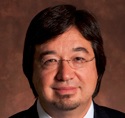 |
| Biogen Chief Medical Officer Al Sandrock |
After suffering back-to-back R&D and franchise setbacks, Biogen ($BIIB) is beefing up its pipeline with a late-stage autoimmune drug, handing over $60 million in cash and promising up to $484 million in milestones to complete the pact with Mitsubishi Tanabe.
In exchange, Biogen is getting its hands on MT-1303, an oral S1P receptor drug that has wrapped Phase II for multiple sclerosis and will now get hustled through a late-stage program. The Big Biotech--which gained ex-Asia rights in the deal--also plans to evaluate its potential for inflammatory bowel disease, sizing up its value as a remedy for ulcerative colitis while it considers launching a late-stage study for Crohn's disease.
Mitsubishi is also likely to stay closely connected to Biogen as it hashes out its game plan for this treatment. The Japanese company can stay involved in Biogen's clinical program and has co-promotion rights to the drug in the U.S. for those IBD indications.
Two months ago Biogen had to rewrite the company's game plan after a setback for its closely-watched Alzheimer's drug as well as a nasty miss on projected revenue for its Tecfidera MS franchise. In July Biogen CEO George Scangos promised analysts that the company would get aggressive in the dealmaking phase, bagging more products for a pipeline that has little in the way of near-term catalysts to whet investors appetite for its stock.
This new deal could put them on a crash course with Celgene ($CELG), which recently paid $7.2 billion for Receptos ($RCPT) largely on the value of its Phase III S1P drug, ozanimod for IBD. Celgene says that drug could be worth up to $6 billion in peak annuals sales. Arena Pharmaceuticals, meanwhile has its own S1P drug in the clinic as well.
"Based on compelling efficacy and safety data, we believe that MT-1303 could be a best-in-class S1P modulator," said Al Sandrock, group senior vice president and chief medical officer at Biogen. "There is a great need for effective oral therapies for the treatment of inflammatory bowel disease and other autoimmune indications, and we are excited to strengthen our late-stage pipeline with this next-generation oral investigational therapy."
- here's the release